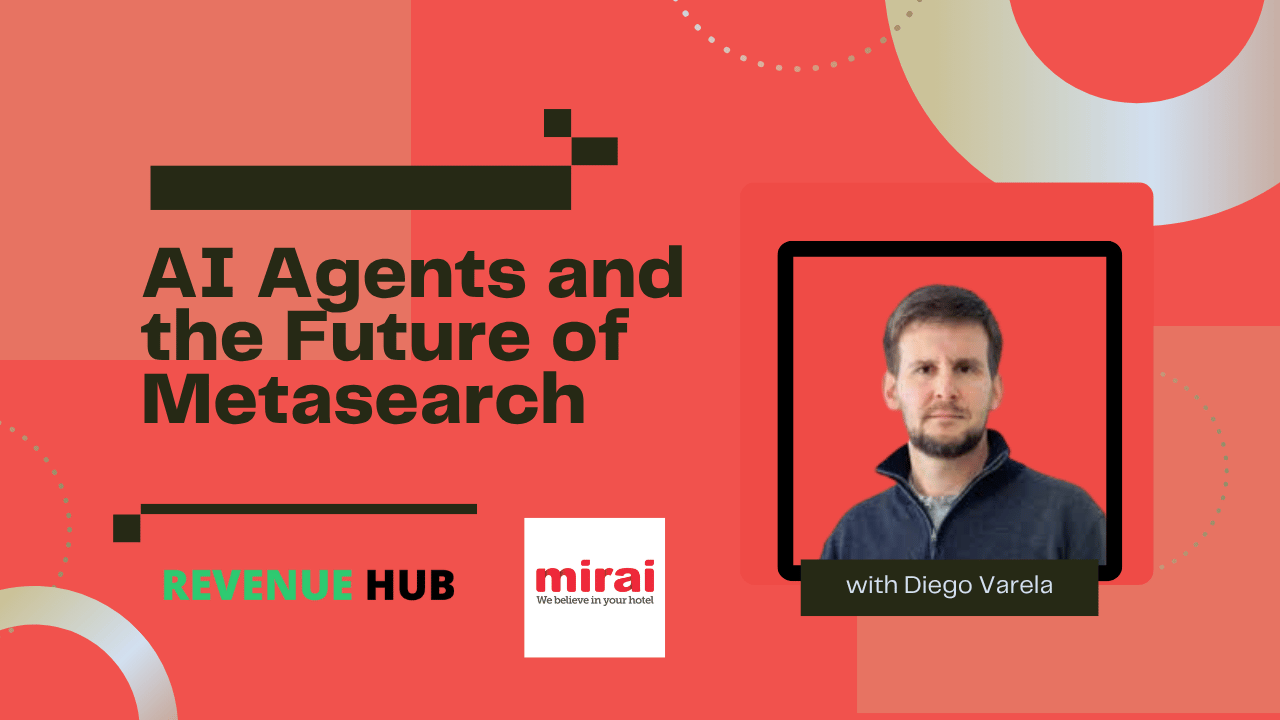The rise of AI agents is dominating tech conversations in 2025 – and for good reason. From Google’s Gemini to ChatGPT’s Operator and partnerships like Perplexity with TripAdvisor or Kayak.ai powered by OpenAI, the way consumers plan travel is entering a period of rapid transformation. But what does this mean for hotel metasearch, and how should general managers respond?
We recently spoke with Diego Varela, Metasearch Product Owner at Mirai, a company with three decades of experience helping hotels boost direct bookings. Diego brings over 11 years of metasearch expertise and has a front-row seat to how the industry is evolving.
NB: Mirai are one of our Expert Partners
Subscribe to our weekly newsletter and stay up to date
Will Metasearch Become Less Relevant?
Despite the buzz around AI agents, Diego is clear: metasearch isn’t going anywhere. “The core need – online price comparison – isn’t changing,” he says. In fact, as more of the global population begins to travel, particularly in Asia and India, and as prices continue to climb, price transparency will only become more important.
What will change is how consumers compare prices. Younger generations are already using AI-powered platforms, as well as social media sites like TikTok and YouTube, to conduct research. This shift is likely to reshape the user journey but not eliminate the need for metasearch – only evolve it.
AI and Metasearch: Competitors or Collaborators?
Rather than fearing AI, many metasearch platforms view it as an opportunity. Google, for instance, owns both a leading metasearch platform and the AI agent Gemini. Integrating these is a logical step. Meanwhile, players like Kayak, TripAdvisor, and Skyscanner are forming their own alliances with AI providers to stay ahead of the curve.
According to Diego, some are even experimenting with building AI agent-like capabilities within their own platforms. “Kayak.ai, for example, doesn’t book flights yet, but it’s clearly evolving in that direction,” he explains. The likely result is AI-enhanced metasearch platforms that remain central to the travel planning process.
What About OTAs and Direct Channels?
Diego notes that OTAs are well-equipped to adapt to AI thanks to their technological resources and data volume. However, they are inherently limited in price comparison, offering only their own rates.
The bigger question lies in the future of direct bookings. AI agents could default to recommending OTAs due to ease of use and breadth of inventory – unless hotels take action. For independents and smaller chains, this means leaning on tech partners to optimize metasearch presence and ensure their direct rates are visible and competitive.
What Should Hotel GMs Do Now?
Hotel general managers don’t need to panic, but they do need to stay proactive. Diego recommends focusing on a solid online distribution strategy: control your rates, ensure parity, and make your direct channel compelling with perks and exclusive offers. Partnering with knowledgeable tech providers can help you stay visible in the evolving digital landscape.
AI agents are coming – but the value of price comparison, and thus metasearch, isn’t disappearing. Instead, they’re both evolving. And with the right strategy, your hotel can evolve with them.
Video Timeline
00:00 – Welcome, Introduction and Soundbites
02:42 – Meet Diego Varela & Mirai’s role in metasearch
06:14 – Will AI agents replace metasearch for hotels?
14:00 – How will metasearch platforms evolve
16:55 – How will AI Agents impact OTAs and direct bookings
23:02 – Will AI Agents develop a preference and potential bias
31:09 – Outro and thanks to Diego





